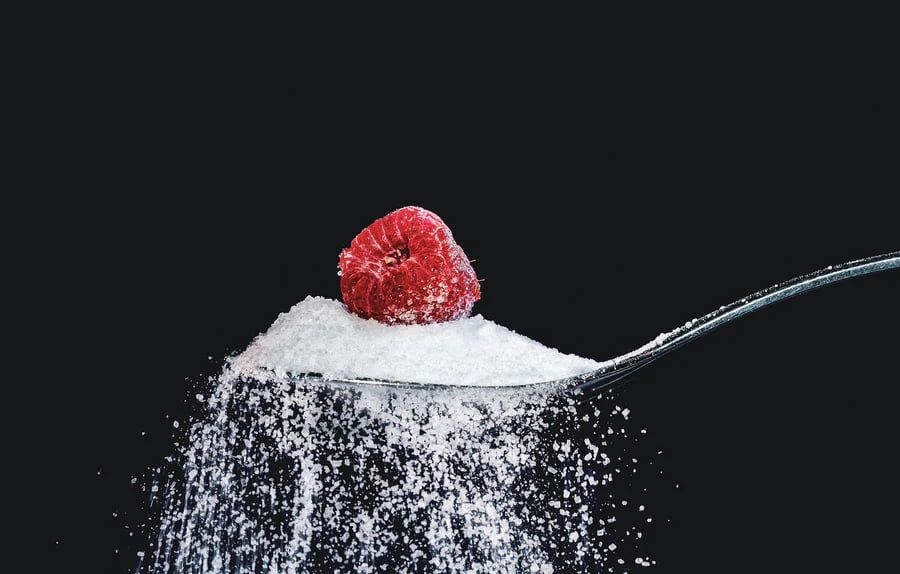
The dangers of sugar
Many people revert to sweet foods to improve their mood as they temporarily lift negative feelings and induce more positive ones. However, studies suggest that a high intake of sugary foods is more likely to have the opposite effect on mental health in the long-term.
In addition to providing excess energy, high intake of sugar results in a pro-inflammatory state, the cause of many diseases and chronic conditions such as obesity, type 2 diabetes, cardiovascular issues, mental health disorders…
High intake of sugar reduces levels of beneficial bacteria and increases those of pathogenic bacteria in the gut. This leads to a disrupted gut, commonly known as gut dysbiosis. As discussed in previous blogs, the gut and the brain are connected via the vagus nerve and therefore have a direct impact on each other in a bi-directional way.
As well as causing bacterial imbalance in the gut, overconsumption of sugar triggers imbalances in certain brain chemicals. A number of studies have linked the consumption of high levels of sugar to a host of mental health issues such as anxiety, mood swings, concentration issues, poor ability to deal with stress, poor decision-making, poor memory, and depression.
When we talk about sugar, what are we referring to exactly?
Sugar is not only the white crystal powder we add to tea, coffee, or cakes. It is also found in many foods such as cereals, yoghurts, pre-prepared meals, processed foods, takeaways, fizzy drinks…The food industry has found clever ways to hide it in all sorts of foods lining the shelves of most of our stores.
So how can we avoid sugar or at least reduce it in our diet?
Here they are a few tips:
- Try to have your tea or coffee without sugar. It may be a bit difficult to start with but after a few days, your palate and taste buds will get used to it and it will become second nature. If it is really proving impossible for you to do so, opt for a natural sweetener such as stevia.
- Opt for plain natural yoghurt. If you want fruit-flavoured yoghurt, just add fresh fruits which contain natural sugars. Flavoured yoghurts are loaded with extra sugar and additives.
- Avoid processed foods which are high in hidden sugar and salt, and increase your intake of wholesome unprocessed foods (fresh fruits and vegetables, nuts and seeds, fish), full of natural nutrients.
- Replace simple carbohydrates such as white bread/pasta/rice with complex wholemeal version (brown bread/pasta/rice…).
- Know how to read food labels and pay attention to the ingredient list: if it is full of ingredients you don’t recognise, stay away from it as it is likely full of preservatives, colouring or additives.
- Be aware that the food industry uses at least fifty other names to cleverly nudge us to buy their products. Look at for words such as agave nectar, sucrose, rice syrup, fruit juice concentrated, galactose, maltodextrin, date sugar, high fructose corn syrup, golden syrup…
- Try to limit your intake of desserts and confectionery. Replace them with fresh fruits, raw or cooked, or nuts and seeds. Alternatively, you can make your own cake or desserts and reduce the amount of sugar listed in the recipe: you can half the amount of sugar by half on most recipes without affecting its final taste.
- Reduce or avoid your consumption of alcohol, a very high source of sugar.
- Avoid soft or fizzy drinks such as Cola, lemonade, ready-made fruit juices… which are loaded with sugar. Even the diet or “sugar-free” versions are full of hidden sugar, as they are sweetened with artificial sweeteners instead or can contain aspartame. Drink water instead: you can add a sprig of mint or a few slices of lemon to it to add flavour.
- Replace your shop-bought cereals with plain rolled oats or oat bran, add a bunch of different nuts such as hazelnuts, pecan nuts, pistachios… Top with a small amount of dried or natural fruits and a spoonful of unsweetened fermented kefir or plain yogurt or milk. When you choose alternative milk like almond, soya, etc. go for the unsweetened version.
Just try a few of these tips and see how it goes. It is likely that in a short amount of time, you will feel more alert and focused, have more energy, and be able to tackle life’s up and down with a more positive frame of mind!
If you are suffering from any of the symptoms mentioned in this blog, we recommend you consult with a Nutritional Therapist. You can get in touch with me here or call me on 07788 444 199.
References
Satokari, R. (2020). “High Intake of Sugar and the Balance between Pro- and Anti-Inflammatory Gut Bacteria”, Nutrients, 12 (5).
Moon, H-D. Eunjung, L. Oh, M-J. et al. (2018). “High-Glucose or -Fructose Diet Cause Changes of the Gut Microbiota and Metabolic Disorders in Mice without Body Weight Change”, Nutrients, 10 (6).
Knuppel, A. Shipley, M.J. Llewellyn, C.H. et al. (2017). “Sugar intake from sweet food and beverages, common mental disorder and depression: prospective findings from the Whitehall II study”, Scientific Reports, 7.